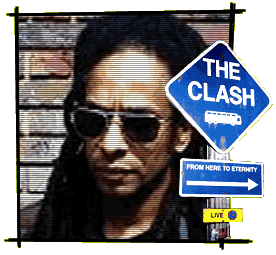
Don Letts was a driving force in the birth of the British punk scene. His film The Punk Rock Movie, featuring The Clash, the Sex Pistols, and their crazy, self-mutilating fans, was one of the first to document the craziness of that time. His collaboration with The Clash continued -- he directed all their music videos, and eventually joined Mick Jones's spinoff band Big Audio Dynamite. So it's only fitting that Letts would direct Westway to the World, a very intimate documentary on the history of The Clash, told mostly by the band members themselves. After a screening of the film at CMJ, I caught Letts for a few questions.
GETTINGIT: You were the DJ at the Roxy, which was the punk club in London. And you brought reggae into the picture. Why was it such a great match for punk?
DON LETTS: I saw The Clash and the whole punk thing happen back in '77. It was so exciting that you wanted to get involved. We were turning each other on through our respective cultures. It wasn't increasing your fan base or whatever. It was such an embryonic time that there weren't any punk records to play so I played reggae.
GI: So where did filmmaking come into the picture?
DL: People were picking up guitars and the stage got kind of filled up. I wanted to pick up something so I picked up a Super 8 camera. There was myself and a guy called Julien Temple. Punk rock encouraged people to get involved themselves, the whole DIY ethic that still works for me on a day-to-day basis.
GI: How do you apply it?
DL: Rewriting the rules, making problems your assets. I did my first feature, Dancehall Queen, two years ago shot on digital video which is pretty punk rock. A little camera cost about $2000, an hour's worth of tape is like $20. Made a movie, was the biggest movie of all time in Jamaica, upset all the records of The Harder They Come, ran for six months, riots on the streets. That's punk rock.
GI: That is punk rock!
DL: The VX 1000E, guys. A little tiny baby camera.
GI: How did the new Clash documentary come about?
DL: Sony is putting out a record and, as with most of these things, the idea was conceived really as a long advert. Videomakers think they're making art and it's really a commercial for the damn record. I'm used to working within that framework. But within that, there's still room to maneuver, there's still room to communicate ideas. Good music documentaries reflect the time and capture the era in which they were made. I really wanted to do that with Westway to the World.
GI: Because you also directed all of The Clash's videos. What was that like?
DL: When I started directing videos, the bands were happy to remain as bands, they didn't want to be advertisers or directors. They just wanted to do their thing. And I was allowed to do my thing. And that's why we had such a healthy relationship. The Clash's music was always about something, so I could really put myself into it. I feel like I wasn't just polluting the airwaves with more stuff.
GI: You keep the interviews almost entirely to the band members. Was that a conscious decision to not talk to that many outsiders?
DL: Well, I knew their party line, I knew what lines I could and couldn't cross, and I knew how far I could push them as well. I thought about having a voiceover because most band members can't string a couple of sentences anyway. These guys didn't have that problem. I'm really pleased that they managed to tell their story themselves. That was what was interesting about doing this project, I realized they were all still The Clash. Mick was into every single damn detail, Topper wanted to get some money, Joe was disinterested, and Paul wanted to look good.
GI: You still keep in contact with these guys? Are they still friends?
DL: They're friends but they don't see each other too often. You're getting into territory that I'm not comfortable with, I can't speak for them. People often say to me, "Why didn't they continue?" But I think part of being a great band is knowing when to stop. Most of the great bands I'm turned on by -- five, six, seven years, they're over and out. Longevity was never the point.
GI: With that said, will it never be worth it to collaborate ever again?
DL: Why? They did it once, let somebody else do it! The Pistols did that shit and I have no more respect for them.
GI: What's your next project?
DL: I was hoping you could tell me. I look kind of glamorous here but face it, you last from one project to the other. I'm trying to get beyond that, but that's what you get for being choosy.
Sarah Jacobson is moving to New York to work for Oprah.
